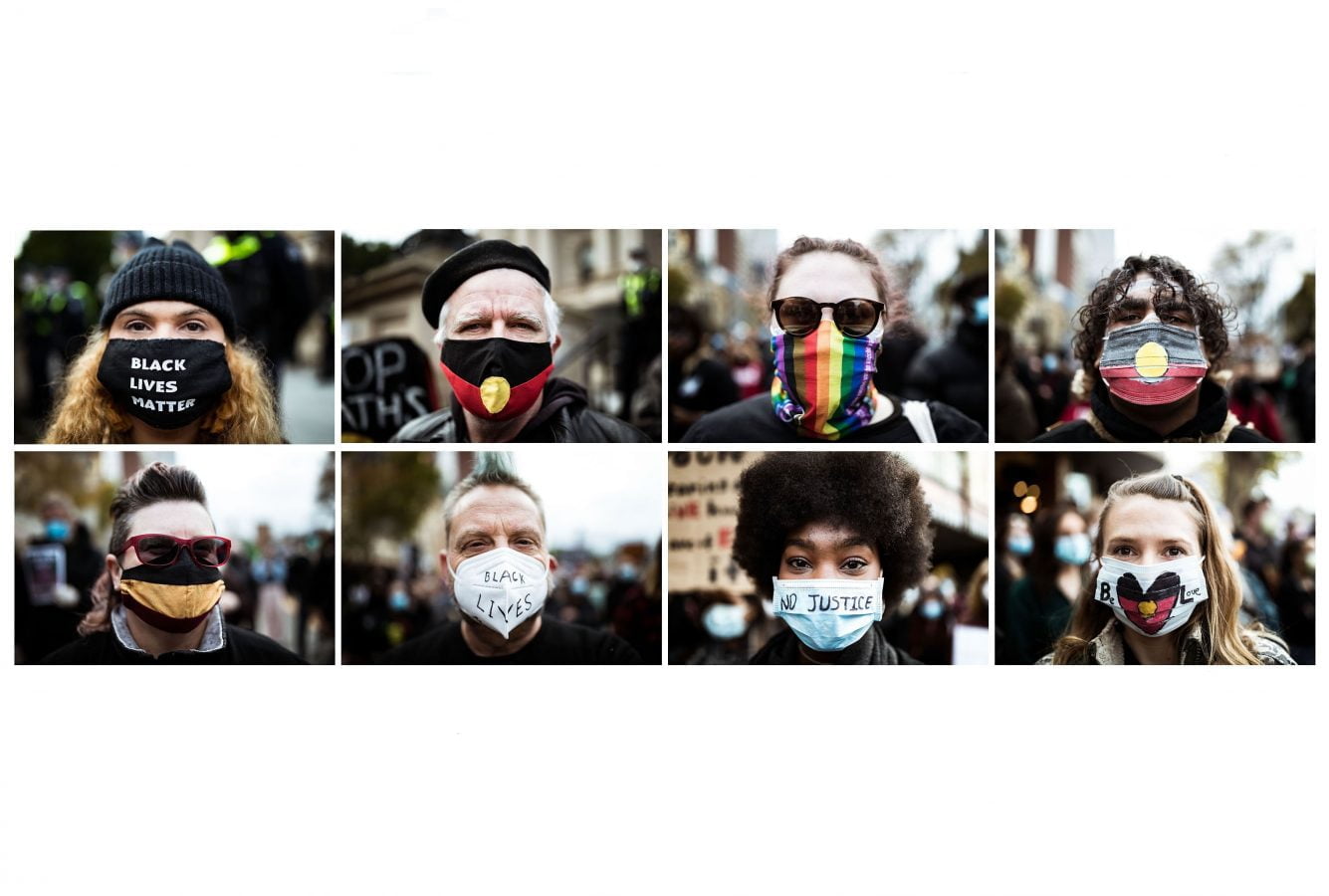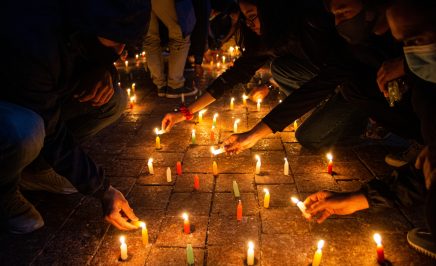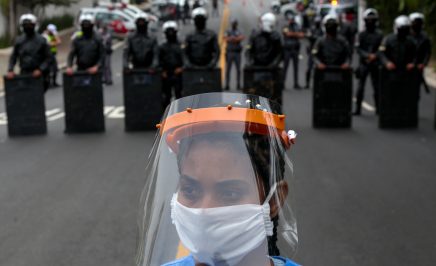Australia is the only liberal democracy without a national human rights protection. Our annual Human Rights Barometer report investigates 7 key areas of human rights concern and highlights how a single Human Rights Act will uphold the rights of everyone and provide a mechanism to hold decision-makers to account.
It’s a challenging time for human rights and countless people around the world are still courageously fighting for their rights to be recognised. For many, justice, freedom and equality are still under threat.
In Australia, the major ongoing human rights issues include structural racism and discrimination which our current laws do not, or do not go far enough, to prevent. These issues are complex; many are embedded in Australia’s history, and they often affect the marginalised individuals and communities including, Indigenous people, women, the disabled and the LGBTQIA+ community.
The launch of Amnesty International Australia’s inaugural annual report, the Human Rights Barometer, reveals how Australians are confused about which rights are protected under law. More than half of Australians believe we already have a national Human Rights Act, and when told we’re the only Western liberal democracy without one, 76% said they would support its introduction.
Currently, human rights protections are found in a range of legislation which are complex, decentralised and sometimes only implied. We should not have numerous individual laws, for example on religious freedoms or sexual discrimination to the exclusion of others, as all human rights are intrinsically linked.
We envision an Australia where everyone is treated with equality, justice, dignity and respect, no matter who you are or what you believe. Implementing a Human Rights Act enshrined in law would make a real and meaningful improvement to human rights protection and have the additional benefit of untangling the current spaghetti bowl of legislation.
Key findings from the 2021 Human Rights Barometer:
Racism
- Racism exists in Australia. While nearly two thirds of respondents (64%) agreed that Australia is a successful multicultural society, 47% believed that Australia has a racism problem and that we should speak out more about it – almost twice as many as those who think we shouldn’t (27%).
- Many Australian groups face racism. More than half the respondents believed that Indigenous people and refugees need the most protection (55% and 51%). This was closely followed by ethnic minorities and immigrants at 45% and 44%.
- Issues around racism, multiculturalism and discrimination in Australia should be more openly discussed. 63% of respondents believed that some ethnic groups and cultures don’t want to fit into the “Australian” way of life.
With racial inequality firmly in the spotlight, now is the best time for Australia to act. Together, we can build an equal Australia where everyone feels safe and a sense of belonging regardless of race, ethnicity, culture or religion.
Freedom of speech and association
- Australians support the right to protest. Overwhelming majority of respondents supported the right to vote (86%), freedom of speech (83%) and the right to protest (68%).
- Many Australians don’t realise that the right to protest is not protected under federal law. 53% of respondents believed freedom of speech to be protected by Australian law. While the High Court has ruled the existence of an implied freedom of political communication, it is not explicitly protected under the Australian Constitution.
Without the right to raise our voices in protest, the world would be a very different place. We need to protect the right to protest so we can continue to create change and make the world fair, free, and just. A federal Human Rights Act in Australia can be used to challenge anti-protests laws in court and protect our human rights.
Refugees
- Australians want an end to offshore detention. 62% of Australians do not support the level of expenditure required to detain asylum seekers ($9 billion+ over the past 8 years) and 52% said they support resettling asylum seekers in Australia if they were found to be refugees.
- There is also support for refugee sponsorship. 55% of Australians support letting communities that have the resources, sponsor refugees and only 18% were against the idea.
By the end of 2025, we aim to raise refugee and humanitarian intake numbers, increase community resettlement, secure the release of those incarcerated on- and off-shore and build safe pathways for refugees into Australia.
A Human Rights Act would ensure all individuals under Australia’s care, regardless of background or identity, have access to basic rights, equal freedoms and dignity.
COVID and human rights
- Australians largely support lockdown laws despite their impact upon rights. 78% of respondents agreed the they worth it to slow the spread of the virus. 32% saw the various lockdowns and restrictions as limiting their rights, yet of this group, 65% saw these restrictions as ultimately justifiable in stopping the spread of COVID-19.
- The rights of children during the pandemic are important to 85% of respondents. AIA reported on instances of human rights abuses of children locked in solitary confinement or being held in QLD watch houses throughout the COVID-19 pandemic. These actions harm already vulnerable children and directly breach international law.
- The flawed vaccine rollout has highlighted an area of human rights. Around 20% of those in support of a national Human Rights Act expressed the protection of most vulnerable groups, such as Indigenous communities and refugees, as the reason underpinning their support.
We have expressed concern over police overreach in the application of public health orders amidst the pandemic. Reports have been raised of discrimination and targeting of vulnerable groups, namely Indigenous, homeless and migrant Australians.
A Human Rights Act would ensure that these inherent rights are balanced and considered with the protection of public health. It could also ensure greater scrutiny and transparency over policing powers to prevent overreach and abuse in the future.
Climate change
- Climate change affects our children of today. 85% of Australians identified the rights of children as important to them personally, or as of importance for others. This reflects an onus on Australians to safeguard the fundamental rights of future generations.
- Climate change affects our right to work. The right to work is important to 73% of Australians. Yet, around 40% of world employment is reliant on industries which are susceptible to environmental degradation and climate change.
- Young people care for climate justice. Majority of young Australians believe climate change is the most important issue facing the global community.
The climate emergency is a human rights crisis. We are working towards a just and sustainable future where there is climate justice for the communities who are most disproportionately impacted by climate change, including the First Nations people and our Pacific neighbours.
Enshrining Australians’ human rights into law would require the government to act in the fight against climate change and to recognise and protect its most vulnerable citizens’ inherent rights.
First Nations rights
- There is a limited awareness of the chasm in experience between Indigenous and non-Indigenous Australians. 36% surveyed believed Indigenous Australians had fewer opportunities, 23% thought they had more and 30% the same.
- Although, there is recognition of Indigenous Australians as a vulnerable group. 55% agreed that Indigenous Australians were among the more vulnerable in society that needed greater protection of their rights.
- Australians want justice, freedom and equality. More than 70% of Australians believe freedom from discrimination and equal treatment before the law is one of the most important human rights.
Our vision is to work with Indigenous communities to directly challenge the overrepresentation of Indigenous people in prison, by raising the age of criminal responsibility. We want to put an end to children falling into the quicksand of Australia’s prison system.
A Human Rights Act will ensure there is a comprehensive anti-discrimination legislative framework in place across Australia.
Gender-based abuse
- 52% surveyed regard women’s rights a marked area of concern for the country’s general population.
- 22% of supporters of an Australian Human Rights Act feel that a national legal framework would provide an important protection for vulnerable people, including the rights of those who are at risk of gender-based abuse and violence.
Our vision is for Australia to become a nation where women and girls live free of gender-based violence and discrimination – this is a human right. Together, we can pressure our leaders to commit to ensuring women and girls safety, which includes better legal protections and access to justice.
A federal human rights protection would be a valuable and democratically supported strategy for providing a more robust legal framework to protect the rights of those who are at risk of gender-based abuse and violence.
While there’s still work underway to ensure everyone enjoys their human rights, we know there is hope. Our collective voices are powerful enough to change society for the better. With your every action, every contribution, we move closer to a world where human rights are enjoyed by everyone, everywhere.
Amnesty International Australia is leading the way on protecting and defending human rights. Over the next five years, we’ll strive for systemic change on the human rights issues that are vital to our allies, partners and the people of Australia. Our vision is to sustain the ground so many fought hard to and take purposeful action to further advance human rights. View our Australian campaigns.









